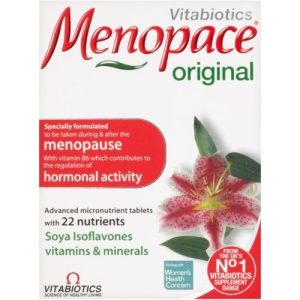Chemist.net Cookie Policy : We use cookies to enhance your user experience. To find out more please view our cookie policy
Navigating the Perimenopause Journey: Symptoms and Treatments

Perimenopause is a natural phase in a woman's life, signalling the gradual shift from fertility to menopause. This transitional period typically begins in a woman's 40s but can start earlier or later and is marked by a range of physical, emotional, and hormonal changes. In this blog, we will explore the symptoms of perimenopause and discuss various treatment options to help women navigate this transformative time with grace and ease.
Understanding Perimenopause
Perimenopause is a gradual process that can last for several years before a woman reaches menopause, which is defined as 12 consecutive months without a menstrual period. During this phase, the ovaries start to produce less oestrogen, the hormone responsible for regulating the menstrual cycle and various aspects of female health. These hormonal fluctuations can lead to a wide array of symptoms that affect both the body and mind.
Common Symptoms of Perimenopause
- Irregular Menstrual Cycles: One of the most noticeable signs of perimenopause is changes in the menstrual cycle. Periods may become irregular, shorter, or longer, and the flow may be heavier or lighter than before.
- Hot Flushes and Night Sweats: Many women experience hot flashes, characterised by a sudden feeling of intense heat, often accompanied by sweating. These can also occur at night, disrupting sleep.
- Mood Swings and Emotional Changes: Hormonal shifts can lead to mood swings, irritability, and increased feelings of anxiety or depression. Emotional changes can be challenging to cope with, and seeking support from friends, family, or a mental health professional can be beneficial.
- Vaginal Dryness and Painful Intercourse: Reduced oestrogen levels can lead to vaginal dryness, making intercourse uncomfortable. This can affect a woman's sexual health and overall quality of life.
- Sleep Disturbances: Hormonal changes, hot flushes and night sweats often disrupt sleep patterns, leading to fatigue and daytime drowsiness.
- Weight Gain: Some women may experience weight gain, particularly around the abdomen, as a result of changing hormone levels and metabolism.
- Changes in Libido: Decreased oestrogen levels can also affect sexual desire and lead to changes in libido.
- Bone Health: Oestrogen plays a role in maintaining bone density. During perimenopause, bone loss can accelerate, increasing the risk of osteoporosis.
Treatment Options for Perimenopause
The treatment for perimenopause varies depending on the individual's symptoms, overall health, and preferences. Here are some common approaches to managing perimenopausal symptoms:
- Lifestyle Changes:
- Diet: A balanced diet rich in calcium and vitamin D can support bone health.
- Exercise: Regular physical activity can help manage weight and reduce mood swings.
- Stress Reduction: Relaxation techniques, such as yoga or meditation, can help alleviate emotional symptoms.
- Hormone Therapy:
- Hormone Replacement Therapy (HRT): Oestrogen and, sometimes, progestogen, can be prescribed by your doctor to alleviate hot flashes, vaginal dryness, and other symptoms. However, HRT is not suitable for all women and should be discussed with a healthcare provider.
- Vaginal Dryness Remedies:
- For vaginal dryness and discomfort during intercourse, try a cream specifically formulated for vaginal dryness.
- Natural Remedies:
- Some women find relief from perimenopausal symptoms through natural remedies such as black cohosh, soy isoflavones or evening primrose oil. Shop now for menopause supplements
- Support and Counselling:
- Psychological support, including therapy or support groups, can help women manage the emotional challenges of perimenopause. Having a conversation with friends of the same age can help too, you'd be surprised how many of them are experiencing the same symptoms!
Conclusion: Perimenopause is a natural phase of a woman's life, but it can present significant challenges. Understanding the symptoms and exploring treatment options is vital for maintaining a good quality of life during this transition. Every woman's experience is unique, so it can be a case of trial and error to see what works best for you.
Chemist.net Recommends


